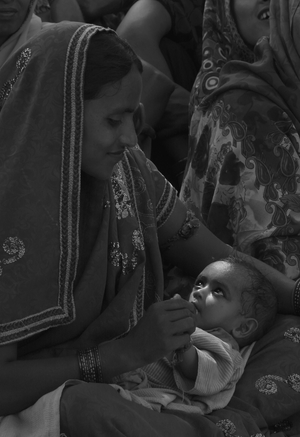“As public health experts driven by a missionary zeal to reduce those ‘numbers’ and our collective sense of shame, we often lose sight of the love that binds a mother with her baby and how much the loss of that one baby means to that family.
Only when we recognize and respect that love – and truly believe that the commitment of the mother and the family to the well being of their baby can only be far greater than ours – it is only then that true exchange, innovation and empowerment can happen."
- Dr. Vishwajeet Kumar
It all began in the summer of 2003, when our founder, Dr. Vishwajeet Kumar chose to return from the US to India to work with communities to save newborn lives in Uttar Pradesh, the global epicentre of newborn and maternal deaths. UP loses 240,000 newborns, equivalent to the number of lives lost in the deadly Indian Ocean tsunami of 2004, to deaths from preventable causes every year.
In 2003, in the Shivgarh region, 80 out of 1000 newborns used to die each year, mostly due to preventable causes. When Dr. Kumar spent time in the community, he realised that the typical epidemiological lens of defining it as ‘neonatal mortality rate’ may not be the best approach for change at the community level.
Instead, he tried to view the problem from the community’s perspective. A mortality rate of 80 out of 1000 is equivalent to a survival rate of 920 out of 1000, i.e. ninety-two percent. That’s an A, and pretty impressive given their meagre resources. Did they have the potential to save more babies with a little help from science? Of course, yes.
Dr. Kumar believed that the approach therefore, needed a paradigm shift from that of ‘solving a problem’ to that of ‘realizing innate potential’. This was how the ‘Saksham’ project was born… the word ‘saksham’ in hindi, means ‘having the innate ability’. Thus, the belief that communities have the innate potential for transformation was woven into the name of the project itself.
The first task was to help them believe that it was indeed within their power to save their babies, and not a matter of fate or ‘evil spirit’, as they had earlier believed. Based on a thorough understanding of their existing practices and identifying critical opportunities for change, the Saksham team chalked out a plan. They realised that creating change was not just a matter of communication, as was widely believed, but had to be approached from the perspective of change management. The term ‘Behavior Change Management’ or BCM was coined to denote this process (read our article).
We found that even in this sub-tropical climatic zone, existing practices combined with sub-optimal housing conditions and innate vulnerability of newborns put all newborns at the risk of hypothermia. This was a new concept for the community, and they coined the term ‘thanda bukhar’ or ‘cold fever’. ‘Thanda bukhar’ could be easily prevented by modifying key practices, and even managed with the help of skin to skin contact between the mother and the baby (read our article). It was so much more amenable and within their locus of control, as compared to the ‘evil spirit’!
Thus the intervention, based on scientific principles, but adapted to community rationale, beliefs and social ecosystem, was launched in partnership with the community. We evaluated its effect using a cluster randomised controlled trial. Within 16 months, the neonatal mortality rate in the intervention villages had fallen by 54% (read our main impact paper published in The Lancet). What’s more, given the nature of our participatory process, social equity, gender equity and maternal health outcomes also improved, even though they were not directly targeted by the intervention (read our articles on gender equity and maternal health).
The Shivgarh essential newborn care intervention was adopted into the Child Survival Program of the Govt. of Uttar Pradesh, and has also inspired several newborn survival programs in Africa.
Community Empowerment Lαβ™ was set up in 2011 in order institutionalise our values and work, spawn new innovations for impact and take them to scale.
Watch Dr. Kumar's TedX talk @ TEDxDelhi where he spoke about the Shivgarh trial and the century of innovation and the challenge of getting these innovations to communities that need them.

